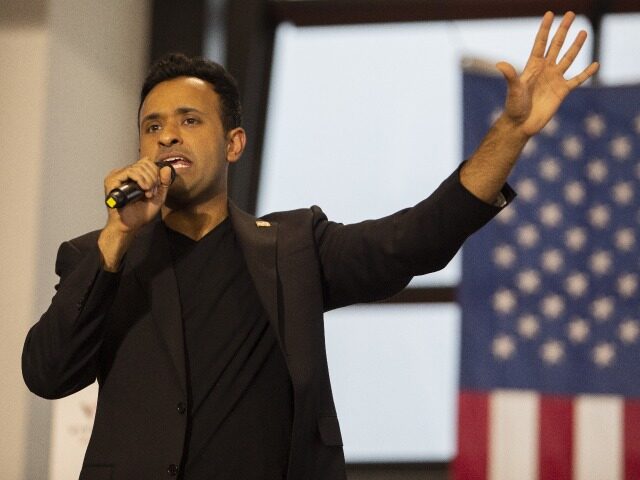Republican presidential candidate Vivek Ramaswamy says, if he is elected, he will call on the U.S. Congress to repeal the Espionage Act of 1917, which he sees as “one of the most un-American laws” in history.
After asking Congress to repeal the law, he “will instruct the U.S. Department of Justice to stop enforcing it in the meantime,” Ramaswamy stated in a press release shared via email, which pointed to his larger Wall Street Journal op-ed on Monday about the law.
The Espionage Act has made headlines on multiple fronts in recent weeks, including the 37-count federal indictment against former President Donald Trump in the case concerning classified material he allegedly took to Mar-a-Lago at the end of his presidency. Thirty-one of the counts levied against the 45th president fall under the act.
The Espionage Act is one of the most un-American laws Congress has ever enacted. If elected, I will ask Congress to repeal it and will instruct the U.S. Department of Justice to stop enforcing it in the meantime. ⁰⁰Enacted by the Godfather of the Administrative State himself,…
— Vivek Ramaswamy (@VivekGRamaswamy) June 26, 2023
WikiLeaks publisher Julian Assange also faces a 17-count indictment under the act, and his request to block extradition to the United States was blocked by a United Kingdom judge earlier this month. His case relates to a myriad of classified materials he and WikiLeaks allegedly procured from Chelsea Manning, then-Bradley Manning, a former intelligence analyst in the U.S. Army.
Late President Woodrow Wilson, who the candidate called “the Godfather of the Administrative State,” signed the legislation, which Ramaswamy contends was established to “quash antiwar political dissent during World War I.”
“It criminalized not only spying for enemies, but also any attempt to encourage ‘disloyalty’ among military ranks. Prosecutors enforced the act aggressively, using it to imprison hundreds of antiwar activists and political dissenters,” he added.
George Washington University Law Professor Jonathan Turley and others have also been critical of the law. Turley, this month, noted in an op-ed for the left-wing Daily Beast that the century-old law “often seems like the last refuge of the government when it lacks any other means to punish targeted persons.”
Ramaswamy contended in his article that hundreds of Espionage Act infractions likely occur on a daily basis in the United States, “but politically disfavored opponents are the ones who are ultimately targeted” before pointing to Assange.
“Assange was indicted under this law, but the Washington press corps reports leaked information with impunity,” he wrote in the op-ed.
Regarding Trump’s case, Ramaswamy asserted in his Wall Street Journal piece that the Presidential Records Act of 1978 “gives the president the sole authority to decide what records to take with him when he leaves office.” However, he added that the “Espionage Act nullifies—or at least confounds—subsequently enacted laws that apply to specific types of government documents.”
The prosecution of Trump under the Espionage Act is further evidence the act “is again a weapon against dissent, as it was in 1917,” he claimed:
Judge Amy Berman Jackson held in the “sock drawer” case that Bill Clinton’s decision on what to keep was judicially unreviewable. That statute would be meaningless if, as the Justice Department now contends, the Espionage Act is broad enough to criminalize an exercise of presidential discretion expressly granted under the 1978 act. The indictment of Mr. Trump, which doesn’t even mention the Presidential Records Act, suggests the Espionage Act is again a weapon against dissent, as it was in 1917.
The 37-year-old, who believes he is more closely aligned with the Donald Trump of 2015 than today’s Trump is, has previously vowed to pardon Trump and Assange if elected president.
Watch — Vivek Ramaswamy: I Would Pardon Trump If Elected
“We cannot have two tiers of justice: one for Trump on government document retention, another for Biden. One for Assange, another for Manning. One for BLM/Antifa, another for peaceful protesters on January 6,” Ramaswamy said on the day of Trump’s indictment.
Although Ramaswamy believes that spies must be prosecuted and the country’s records must be protected, he argued in his op-ed it could be done without the Espionage Act but with other laws already on the books.
“More than a dozen more-specific federal statutes criminalize spying, hacking and misuse of government records. These statutes require criminal intent,” he wrote.
Related — MSNBC’s Velshi: Trump Aside, the Espionage Act Has Problems and Is Used to Attack Whistleblowers

COMMENTS
Please let us know if you're having issues with commenting.